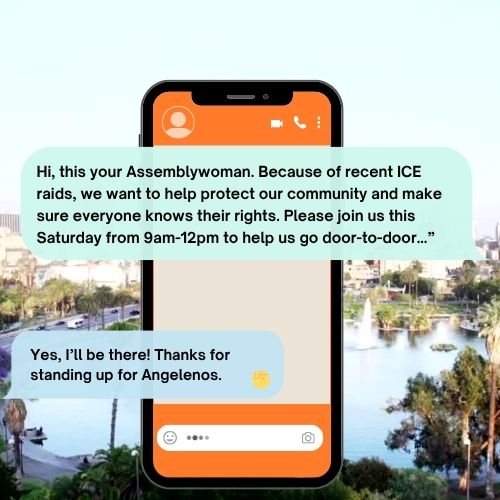
Super Charge Your Campaign with Relational Organizing

Super Charge Your Campaign with Relational Organizing
A tactic that punches above its weight when it comes to persuasion and get out the vote strategies is relational organizing. For the past few cycles, relational organizing has only been seen as an option for massive, well-funded campaigns. We’re making the case for why every campaign – from school board to U.S. Senate – should develop and invest in relational organizing to win.
What is Relational Organizing?
Relational organizing is a strategy that leverages personal relationships to spread political messages and encourage voter turnout. Instead of relying solely on traditional methods like phone banking or canvassing, campaigns encourage supporters to reach out to people they know personally. This approach capitalizes on existing trust and social bonds, making political conversations more impactful and persuasive – but uses tools like HomeField to connect voters to their friends.
The Effectiveness of Relational Organizing
The success of relational organizing lies in its ability to create genuine, trust-based interactions. One compelling data point comes from a study conducted during the 2020 election cycle. According to research by the Analyst Institute, voters contacted through relational organizing were up to 2.5 times more likely to vote than those reached through traditional campaign methods. This significant increase highlights the power of personal connections in driving voter engagement and turnout.
Why Relational Organizing Works:
- Trust and Authenticity: People are more likely to trust and act on information from someone they know personally. When a friend or family member discusses the importance of voting or a candidate's policies, the message is perceived as more authentic and credible.
- Higher Engagement: Conversations between friends are naturally more engaging and less scripted than traditional campaign communications. This organic dialogue can lead to more meaningful exchanges and a deeper understanding of the issues at stake.
- Peer Pressure: Social norms and peer pressure can significantly influence behavior. When people see their friends and family actively participating in the political process, they are more likely to follow suit to maintain social cohesion.
Implementing Relational Organizing in Your Campaign
For campaigns looking to harness the power of relational organizing, the following steps can be instrumental:
- Identify Key Supporters: Start by identifying and training your most enthusiastic supporters. Equip them with the tools and messaging they need to effectively engage their networks.
- Provide Resources: Offer scripts, talking points, and digital tools to help supporters initiate conversations. Tailored materials can make it easier for them to convey the campaign's key messages confidently.
- Track and Measure: Use technology to track the reach and impact of relational organizing efforts. Platforms like relational organizing apps can help monitor who is being contacted and measure engagement levels.
- Celebrate Successes: Recognize and reward supporters who actively participate in relational organizing. Celebrating their efforts can boost morale and encourage others to get involved.
Relational organizing is more than just a buzzword; it's a proven strategy that leverages the power of personal relationships to drive political engagement. As evidenced by the increased likelihood of voter turnout, this approach can significantly enhance the effectiveness of campaign efforts. By empowering supporters to engage their networks, campaigns can create a ripple effect of political activism that extends far beyond traditional outreach methods.
In an era where there’s so much noise coming at voters – from social media to traditional media – your campaign can break through and make a difference by employing relational organizing. Want to develop a relational organizing strategy that wins? Reach out to Good Fight Political!




